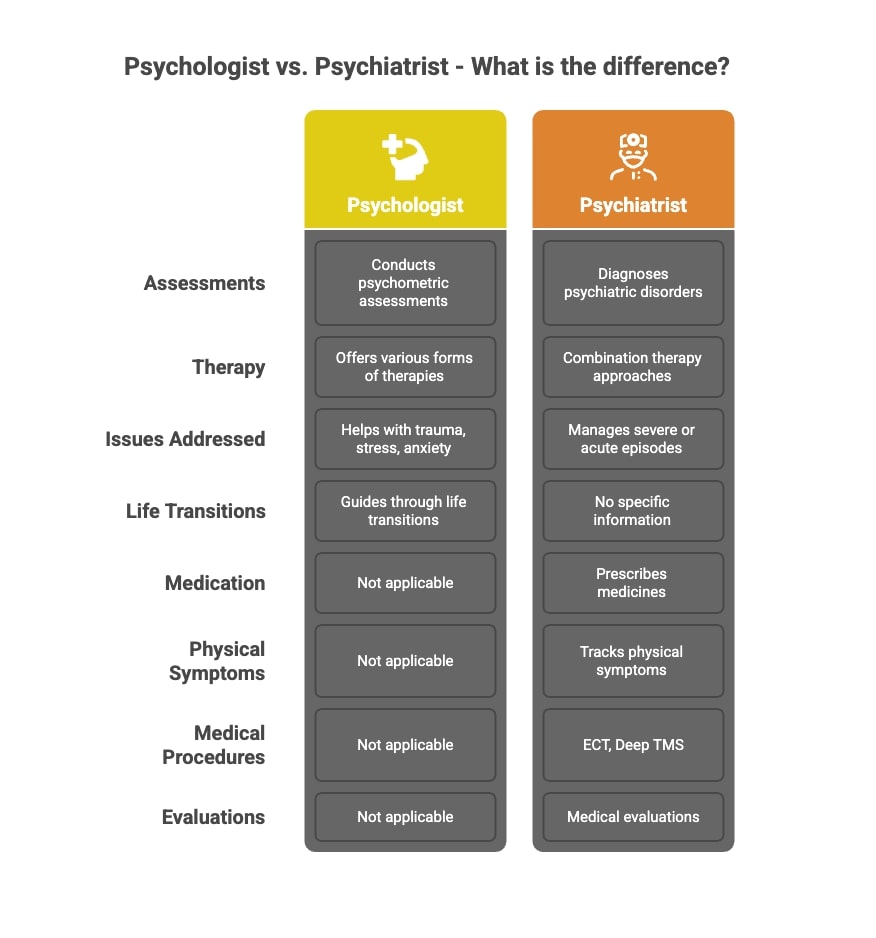
Amaha / / / Psychologist vs Psychiatrist: What's the Real Difference and Who Should You Choose?
ARTICLE | 5 MINS READ
Psychologist vs Psychiatrist: What's the Real Difference and Who Should You Choose?
Published on
31st Jul 2025

Dr Anuradha Kabra
MD Psychiatry

72% of Indians approach non-specialists (family doctors or spiritual healers, astrologers) before seeking mental health experts like psychologists or psychiatrists[1].
Both psychologists and psychiatrists help people with mental health issues, but their approach and tools to help the client are different.
“People often walk in with pain they can’t put into words. Sometimes it’s the brain, sometimes the mind but always the person and their heart behind both.” — Dr. Divya Nallur, Psychiatrist, Bangalore, Amaha
What is a Psychologist?
A Psychologist is like a mental health detective they are also known as ‘Therapists’. They study human behavior, emotions, and thought patterns. They use therapy talking, listening, and behavioural techniques to help people manage emotional or mental struggles. In Hindi, we call them "मनोवैज्ञानिक" (manovaigyanik). These professionals spend years understanding why we think and feel the way we do. A psychologist is trained in human behavior and emotional health.
What is a Psychiatrist?
A Psychiatrist, or "मनोचिकित्सक" (manochikitsak) in Hindi, is essentially a medical doctor (MBBS with a specialization in psychiatry) who specializes in mental health. They can prescribe medications and treat severe mental health conditions using equipment and devices as well if needed.

Need guidance deciding whom to choose for your well-being?
Speak to our Care Team, they can help you zero down your choices and help you get started.
The Pedigree and Educational Difference
Psychologist's Path:
- Complete a Bachelor's degree (usually in Psychology)
- Pursue Master's in Psychology (2 years)
- Often complete MPhil or PhD
- Specialized training in counselling therapy approaches
- No medical school required
Psychiatrist's Path:
- Complete MBBS (medical degree)
- Specialize in psychiatry through MD/DPM
- Medical residency training
- Can prescribe medications
- Understand biological and neurological aspects of mental health
What Does a Psychologist Actually Do?
This is what a day in the life of a psychologist looks like -
- Conduct psychometric assessments (like IQ tests, personality profiles, ADHD or other concern evaluations)
- Offer cognitive behavioural therapy (CBT) Dialectical therapy, family therapy, even child therapy and other forms of therapies
- Help with issues like trauma, relationship stress, anxiety, self-esteem, and more
- Guide people through life transitions like breakups, grief, career confusion, parental stress, job loss, divorce
I remember Priya, a software engineer from Mumbai, telling me how her psychologist helped her recognize her perfectionist patterns. "She made me realize I was setting impossible standards for myself," Priya said. "No medication needed, just changing how I thought about success."
What Does a Psychiatrist Actually Do?
Psychiatrists combine medical knowledge with mental health expertise. They're the ones who can say, "Your depression might be linked to a genetic predisposition"
Psychiatrists are doctors. They’ve studied medicine and then specialized in mental health.
They can -
- Diagnose psychiatric disorders like depression, bipolar disorder, schizophrenia, OCD, ADHD
- Prescribe medicines such as antidepressants, antipsychotics, mood stabilizers, etc.
- Track physical symptoms linked to mental illness like sleep issues, appetite changes, fatigue
- Work closely with psychologists and therapists to offer a 360° holistic care approach
- Psychiatrists can also help manage severe or acute episodes where safety, medication, or hospitalization might be needed.
Their toolkit includes:
- Medication management
- Medical evaluations
- Treatment of severe mental illnesses
- ECT, Deep TMS and other medical procedures
- Combination therapy approaches
Take Suresh from Delhi. He'd been struggling with severe mood swings that therapy alone couldn't control. His psychiatrist diagnosed bipolar disorder and prescribed mood stabilizers. Within months, he was back to his old self.

The Science Behind Both Approaches
Psychology focuses on:
- Behavioral patterns
- Cognitive processes
- Environmental factors
- Learning and conditioning
- Social influences
Psychiatry emphasizes:
- Neurochemistry
- Brain structure and function
- Genetic factors or Hormonal factors
- Medical conditions affecting mood
- Pharmacological interventions
Therapy actually changes brain chemistry too. It's not just "talk" it rewires neural pathways also known as “neuroplasticity” - Neuroplasticity refers to the brain's capability to adapt and reorganise, rewire its neural pathways, enabling it to adapt and function in ways that are different from its prior condition.
How Do Psychology and Psychiatry Differ in Practice?
Psychology is rooted in behavioural science. It studies how people think, act, and feel. The brain, sure but also thoughts, choices, relationships, childhoods.
Psychiatry is part of medical science. It deals with brain chemistry, biology, and pathology and how neurotransmitters and hormones might be impacting your mood or thoughts.
The differences show up in everyday treatment:
Session Style: Psychologists typically spend 45-60 minutes in deep conversation. Psychiatrists might spend 15-30 minutes focusing on symptoms and medication adjustments.
Treatment Duration: Psychology often involves longer-term relationships. You might see a psychologist for months or years. Psychiatrist visits might be monthly once medication is stabilized.
Both are evidence-based and science-backed. Both use research backed techniques.
Can Psychology and Psychiatry Work Together?
Absolutely. And in most good mental health setups, they do. Let’s say someone’s been feeling anxious and hopeless for weeks. A psychologist may first assess them, understand patterns, and offer therapy. If the distress is deep or linked to past trauma, they may suggest long-term psychotherapy. But if there’s insomnia, low energy, suicidal thoughts, or inability to function day-to-day? A psychiatrist may step in to evaluate if medication is needed. Both professionals keep communicating.
That’s how real recovery happens. As a team effort. And that is exactly how your therapy experience is designed at Amaha using our proprietary collaborative care model. You get access to Self-care tools + Community support on the Amaha app, Psychometric Assessments, Therapy sessions with Psychologists as well as medication support from Psychiatrists and even In-patient services at the Amaha Hospital.
What's Better: Psychologist or Psychiatrist?
It's not about which is better, It's about what you need right now.
Choose a Psychologist when:
- You want to talk through problems
- You're dealing with relationship issues
- You prefer non-medication approaches
- You have mild to moderate symptoms
- You want to develop coping skills
Choose a Psychiatrist when:
- You suspect you might need medication
- You have severe symptoms
- You've tried therapy without sufficient improvement
- You have complex mental health conditions
- You want a medical evaluation
Making Your Decision: Practical Steps
A few questions to reflect on and you are free to choose -
- How severe are your symptoms?
- Have you tried talking to friends or family without success?
- Are you open to medication if needed?
- Do you prefer medical or psychological approaches?
Many people benefit from starting with a psychologist. If medication becomes necessary, they can refer you to a psychiatrist while continuing therapy.
The Final Verdict: Whom should you Choose?
Mental health isn't one-size-fits-all. What worked for your friend might not work for you. The important thing? Taking that first step toward getting help. We recommend starting with a licensed therapist with a reputed organisation like Amaha and then letting them assess your situation to guide you through your recovery journey, they will be in a better position to suggest if you need medication from a psychiatrist or anything more.
Remember, seeking mental health support isn't weakness – it's wisdom. Whether you choose a psychologist, psychiatrist, or both, you're investing in your wellbeing.
Your mental health matters. Choose the professional who feels right for your situation, and don't hesitate to switch if needed. After all, finding the right fit is part of the healing journey.

Temporary Sadness or Depression - Find out for Real
Find out how severe are your Symptoms. Is it just normal sadness or are you suffering from depression disorder?
Frequently Asked Questions
Can a psychologist prescribe medication in India?
No, psychologists cannot prescribe medication in India. Only psychiatrists, who are medical doctors, have the authority to prescribe psychiatric medications. However, psychologists can refer you to a psychiatrist if they believe medication might be helpful.
Is seeing a psychiatrist more expensive than a psychologist?
Generally, psychiatrist consultations tend to be more expensive than psychologist sessions in India, ranging from ₹1,500-₹3,000 compared to ₹1,000-₹2,000 for psychologists. However, costs vary significantly based on location, experience, and clinic type.
How do I know if I need therapy or medication for my mental health?
If you're experiencing mild to moderate symptoms like stress, relationship issues, or everyday anxiety, start with a psychologist. If symptoms are severe, interfering significantly with daily life, or if you've tried therapy without improvement, consider consulting a psychiatrist.
Can I see both a psychologist and psychiatrist at the same time?
Yes, many people benefit from seeing both professionals simultaneously. This collaborative approach addresses both the medical and psychological aspects of mental health conditions, often leading to better outcomes.
What's the meaning of psychologist and psychiatrist in simple Hindi terms?
Psychologist is "मनोवैज्ञानिक" (manovigyanik) - someone who studies the mind and behavior. Psychiatrist is "मनोचिकित्सक" (manochikitsak) - a medical doctor who treats mental health conditions with medicine and therapy.
What is Psychologist meaning in Hindi?
Psychologist का हिंदी में मतलब है "मनोवैज्ञानिक"।
मनोवैज्ञानिक वे विशेषज्ञ होते हैं जो व्यक्ति के विचारों, भावनाओं, व्यवहार और मानसिक प्रक्रियाओं को समझने और सुधारने में मदद करते हैं। वे बातचीत और थेरेपी के ज़रिए मानसिक समस्याओं का समाधान करते हैं, लेकिन दवाइयाँ नहीं देते।
What is Psychiatrist meaning in Hindi?
Psychiatrist का हिंदी में मतलब है "मनोरोग विशेषज्ञ"।
मनोरोग विशेषज्ञ एक मेडिकल डॉक्टर होते हैं जो मानसिक रोगों की पहचान कर सकते हैं और ज़रूरत पड़ने पर दवाइयाँ भी दे सकते हैं। वे गंभीर मानसिक स्थितियों जैसे डिप्रेशन, बायपोलर डिसऑर्डर या स्किज़ोफ्रेनिया का इलाज करते हैं।
Was This Article Helpful?
Yes
No



Build a good life for yourself
with Amaha
Best App
for Good
on Google Play India

Amaha is equipped to provide care and support for individuals experiencing severe psychological distress, including complex psychiatric disorders and other complex conditions. For those in need of more intensive care and daily support, we are launching an in-patient care facility in Bengaluru soon.
If you or someone you know is experiencing at-risk behaviors or safety concerns, or any other life-threatening crisis or critical mental health situation, contact a helpline or go to the nearest hospital or emergency room. Having a close family member or friend with you for support can be invaluable during this time.
For emergency mental health support, please call the national Tele MANAS helpline at 1-800 891 4416.